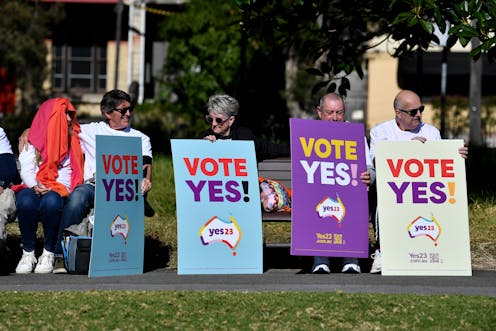Voice support slumps in Essential poll; LNP leads in Queensland
- Written by Adrian Beaumont, Election Analyst (Psephologist) at The Conversation; and Honorary Associate, School of Mathematics and Statistics, The University of Melbourne

An Essential poll, conducted July 5-9 from a sample of 1,125, had “yes” to the Indigenous Voice to parliament leading by 47-43, with 10% undecided. There has been a methods change from previous Essential polls that had no undecided option.
The last Essential Voice poll in June gave “yes” a 60–40 lead, in contrast to a 51–49 “no” lead from Resolve in a poll conducted at the same time.
The graph below shows the “yes” lead or deficit in 2023 Voice polls from Newspoll, Resolve, Essential and Morgan pollsters. If the pollster used a forced choice, I have used the forced choice result. The poll result dates are the last dates of fieldwork. There are trendlines for all pollsters. I used the statistical software Minitab for this graph.
The trajectories of Resolve and Newspoll are similar, while Essential has been the most friendly pollster for “yes”. The last Morgan Voice poll was taken in May. While Essential still has “yes” ahead, there is now a clear down trend in “yes” support in this poll.
Other Essential results: Labor leads by 51–44
In Essential’s two party measure that includes undecided, Labor led by 51–44 (52–42 last fortnight). This is Labor’s narrowest lead in Essential since March. Primary votes were 32% Labor (steady), 32% Coalition (up two), 14% Greens (steady), 8% One Nation (up one), 1% UAP (down one), 8% for all Others (steady) and 5% undecided (down one).
By 71–22, voters thought the government could make a lot or a fair amount of difference to the cost of living. Capping prices for electricity and gas was the most pupular option for addressing the cost of living, with 73% saying it would make a difference and the government should do it.
On Australia’s stumping of Jonny Bairstow in the second Ashes Test, 48% thought the Australians were totally justified, 27% said they wouldn’t have done it but the English need to get over it, 9% “same old Aussies, always cheating” and 16% “what’s the Ashes?”.
Be sceptical of claims of existential crises for current opposition parties
A paper for the Centre for Independent Studies is claiming that the Coalition will struggle to win future elections owing to lack of movement to the right among younger generations as they age. But when the Coalition unexpectedly won the 2019 election, there were claims of an existential crisis for Labor.
Internationally, there were claims of an existential crisis for United Kingdom Labour after the Conservatives won a clear majority at the UK 2019 election, but Labour is leading in current UK national polls by about 20 points.
In June I wrote that in continental Europe, the right is advancing, and in the United States Donald Trump has a narrow lead over Joe Biden. This is occurring despite the generational effects the CIS paper claims will damage the Coalition.
If there’s a problem for the Coalition in Australia, it’s probably due to the high percentage of our population that lives in big cities.
Read more: Will a continuing education divide eventually favour Labor electorally due to our big cities?
Last fortnight’s Essential poll
In last fortnight’s Essential poll, voters were asked to rate Albanese, Dutton and Greens leader Adam Bandt from 0 to 10. Ratings of 0–3 were counted as negative, 4–6 as neutral and 7–10 as positive. Albanese had a 36–27 positive rating, down from 41–24 in May. Dutton’s ratings improved to 34–27 negative from 35–23. Bandt was at 38–21 negative.
Respondents were asked whether the government was doing enough, not enough or too much to address various issues. Relieving cost of living pressures had the highest score for not enough (75% not enough, 20% enough, 5% too much). Ensuring affordable and secure rentals rated 69% not enough, 25% enough, 6% too much. Environmental issues had about 40% saying the government was doing enough.
Federal parliament was rated fourth out of five options for ensuring work is a safe place for women, behind the public service, private companies and sporting clubs and ahead of only the entertainment industry.
LNP leads in Queensland Freshwater poll
The next Queensland state election will be held in October 2024. A Freshwater poll for The Financial Review, conducted June 29 to July 2 from a sample of 1,065, gave the Liberal National Party a 52–48 lead over the incumbent Labor government. Primary votes were 40% LNP, 34% Labor, 11% Greens and 15% for all Others with no separate figure provided for One Nation.
LNP leader David Crisafulli led Labor incumbent Annastacia Palaszczuk as better premier by 45–44. It’s unusual for an opposition leader to hold a better PM/premier lead. Poll figures are from The Poll Bludger.
An April YouGov Queensland poll gave the LNP a 51–49 lead, although Resolve still had Labor ahead, but Resolve has skewed to Labor federally and in state polls since the May 2022 federal election.
Labor has governed in Queensland since early 2015, but federally, Queensland is the most conservative state. It was the only state the Coalition won at the 2022 election. By the October 2024 state election, Labor will have governed for almost ten years, so there could be an “it’s time” factor.
The Poll Bludger reported Sunday that “no” to the Voice led in this Queensland-only poll by 50–36 including undecided, or 58–42 excluding undecided.
Authors: Adrian Beaumont, Election Analyst (Psephologist) at The Conversation; and Honorary Associate, School of Mathematics and Statistics, The University of Melbourne
Read more https://theconversation.com/voice-support-slumps-in-essential-poll-lnp-leads-in-queensland-208578





